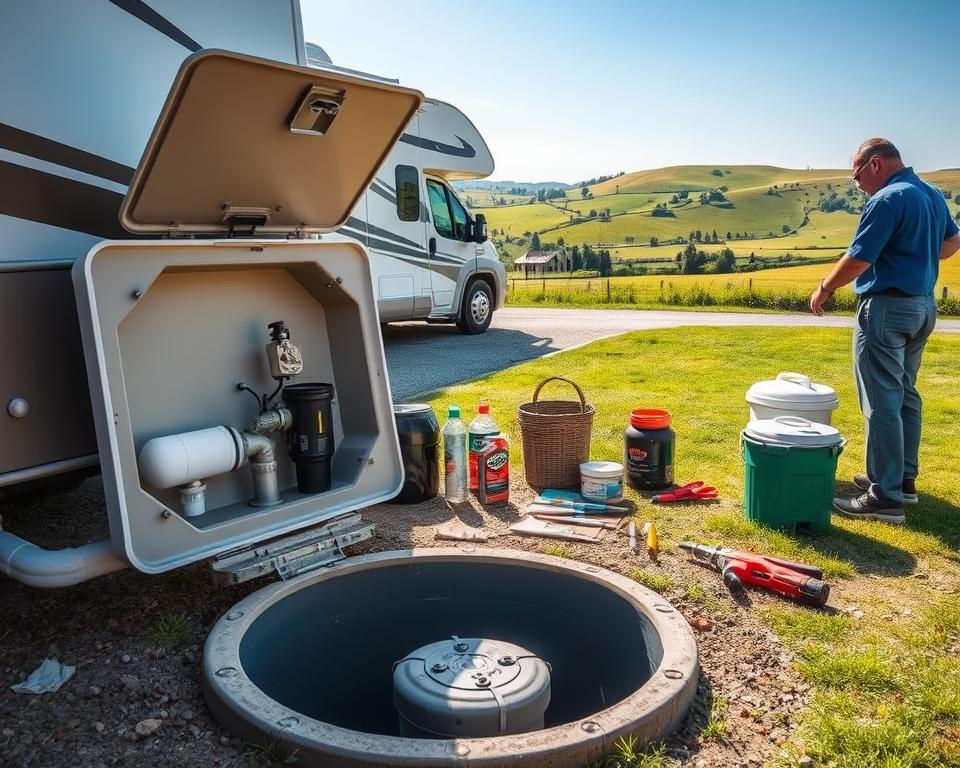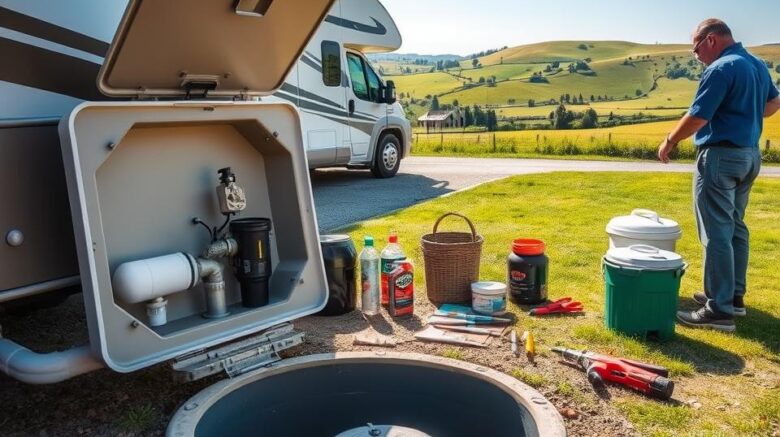Mobile Trailer Septic Tank Pumping: Comprehensive Guide
Have you pondered the repercussions of overlooking your mobile unit’s septic system? For those possessing RVs and mobile units, it’s vital to grasp the essence of RV septic Tank Pumping. It ensures your journeys are trouble-free and living conditions remain sanitary while on the move. By emphasizing regular mobile RV septic pumping near me, this resource aims to make you proactive in caring for your septic system, preventing potential problems — especially when soaking up the great outdoors.
Within these pages, an in-depth insight into finding trustworthy mobile septic services is offered. On top of that, we cover how to recognize when your septic Tank demands prompt attention. Grasping the process for efficient trailer septic Tank Pumping rounds things out. Rather than scrambling to issues as they arise, allow this guide to furnish you with essential knowledge. This helps guarantee your RV experiences remain stress-free!
The Significance of Consistent RV Septic Tank Pumping
Timely upkeep of your RV’s septic Tank is crucial for its wastewater system’s effectiveness. Delaying this can result in clogs and backups, dampening your fun and harming the environment. Sewage leaks from an full Tank can contaminate the area, creating major hazards.
Hiring professional Pumping services like All in Sanitation is wise for trailer owners. This action heads off issues and enhances your system’s functionality and longevity. Timely Pump-outs translate to a safer, safer environment in RV parks and campgrounds.
Understanding Your RV’s Septic System
A motorhome septic system features three primary elements: the black water Tank, grey water Tank, and fresh water Tank. For RV owners, it’s critical to know these parts. They are central in waste management. The black water Tank stores toilet sewage, and the grey water Tank holds water from sinks and showers.
Each Tank has a unique role in keeping the rig sanitary and operational. Checking the levels in the black water and grey water Tanks is vital. It wards off overflows, bad smells, and damage to the septic system.
To illustrate, below is a table that highlights differences between the black water and grey water Tanks:
| Feature | Black Water Tank | Grey Water Tank |
|---|---|---|
| Purpose | Stores sewage waste | Collects wastewater from sinks and showers |
| Maintenance Frequency | Requires routine Pumping | Needs infrequent emptying |
| Potential Issues | Odors, blockages from solids | Risk of grease buildup |
| Typical Size | Generally bigger than grey water Tank | Smaller than black water Tank typically |
Understanding your RV’s septic system is the bedrock for maintenance. It ensures great travel experiences. Paying attention to both Tanks delivers trips with no septic concerns.

Signs Your Septic Tank Needs Pumping
It’s vital to spot when your septic Tank needs Pumping to protect your system sound. Identifying issues early can help avoid major repairs and environmental harm. Key signs that require attention include:
- Slow draining sinks, which may point to a full Tank or clog.
- Gurgling toilets, indicating blocked pipes or a failing septic system.
- Foul odors around your RV, an early warning of rising sewage.
- Pooling water near the drain field, suggesting that your Tank may be overwhelmed.
- Sewage backups in your toilets or drains, a definite sign immediate action is needed.
Staying alert of these signs allows RV owners to respond quickly, preventing grave issues. Monitoring your system and reacting to these indicators can extend your septic system’s lifespan. This approach leads to a better RV experience.
Variables Impacting Pumping Frequency
A septic Tank’s capacity largely influences how often it requires Pumping. Larger Tanks require more spread-out service because they contain more waste, while smaller Tanks require more frequent Pumping.
The campers present using the septic system also affects Pumping frequency. With more RVs, the system experiences heavier strain, necessitating more frequent Pumping. Particularly in peak seasons, adjusting the schedule is important to avoid problems.
Here is a table that summarizes recommended Pumping intervals based on typical scenarios:
| Septic Tank Size | Number of RVs | Recommended Pumping Frequency |
|---|---|---|
| 500 gallons | 1-2 RVs | Roughly every 2-3 years |
| 1000 gallons | 2-4 RVs | Roughly 3-5 years |
| 1500 gallons | 4+ RVs | As often as 1-2 years |
Properly setting your septic Tank’s Pumping frequency enhances its operation. It also lengthens its life and performance. This decision is vital for maintaining system health.
How to Choose a Dependable Septic Pumping Service
Choosing a solid septic Pumping service is essential for your RV’s septic system health. It guarantees quick and thorough Pumping, avoiding pricey future repairs. When searching for a septic service provider, consider these key aspects:
- Experience: Look for companies with a solid track record. Their experience with various septic systems, especially those for trailers, is paramount.
- Customer Reviews: Scan online reviews and testimonials. High feedback and high ratings are signs of a dependable provider.
- Response Time: Quick response times signal a company’s commitment to their customers and readiness to meet their needs efficiently.
- Knowledge of Systems: Specialized knowledge of trailer septic systems distinguishes some services. Providers like All-In Sanitation know these systems well, enabling tailored service.
Prioritize these considerations to secure the most fitting service for your septic requirements. A trustworthy septic Pumping service improves your system’s life and performance, delivering carefree travel adventures.
RV Septic Tank Pumping: What Happens
Motorhome septic Tank Pumping requires essential steps for efficiency and safety. It’s crucial for RV owners to grasp this process before service appointments.
A technician with a trailer-mounted Pump shows up first, designed for mobile systems. This technology allows effective waste removal while defending the environment. They couple the Pump to the trailer’s system with a hose reaching the Tank.
The Pump then extracts the waste out of the Tank. This action is essential to keep the septic system operational and avoid overflow. After emptying, the technician checks the Tank for damage or wear, confirming proper function.
Following the Pump-out, waste disposal is crucial. The hauled waste is brought to treatment facilities for safe processing. This step reduces environmental harm.
The process profits from the trailer-mounted Pump’s effectiveness. Regular service saves time and cost, holding the septic system in optimal condition.
Urgent Septic Pumping Services
Unplanned issues with your septic system can necessitate immediate intervention. For RV enthusiasts, recognizing when to get emergency septic Pumping is crucial to avert further damage and sky-high costs. Situations demanding prompt septic Tank Pumping include backups, unpleasant smells, and sewage leaks. Swiftly tackling these issues often requires septic Tank Pump and haul services to quickly eliminate waste and restore system functionality.
Providers like All in Sanitation offer 24/7 emergency septic Pumping, ensuring help is readily available in a pinch. Taking initiative with these services greatly improves your septic system’s lifespan and performance. Having a trusted septic service close at hand can mitigate expenses and stress in emergencies, delivering uninterrupted enjoyment of RV adventures.
Best Practices for Caring for Your RV Septic System
Keeping your motorhome’s septic system in top shape is crucial. Smart maintenance strategies can sidestep costly problems later. Kick off with regular checks for damage, leaks, or strange smells for RV septic Tank care.
Proper waste disposal is paramount for a healthy system. Don’t flush items that won’t break down, and use septic-friendly products. It’s important that everyone understands how their actions influence the septic system. This makes certain it stays functional and efficient.
- Conduct regular checks for leaks and unusual odors.
- Keep contact with your septic service provider for on-schedule maintenance.
- Utilize septic-safe toilet paper and cleaning supplies.
- Refrain from pouring chemicals down the drain that could harm the balance of bacteria in the Tank.
- Arrange for annual professional inspections to spot potential issues early.
Implementing these steps helps RV owners prolong their trailer septic systems’ life and performance.
Frequent Challenges with RV Septic Systems
Mobile septic systems often experience challenges that frustrate RV owners. Handle these issues early to sidestep bigger problems later. Clogs in septic Tanks are typical, mainly due to not disposing of waste properly. To prevent clogs, stick with RV-safe toilet paper and conduct regular maintenance.
Another major issue is odor control. Bad smells can signal backups or leaks, needing immediate action. To cut odors, make sure the system is well-ventilated and the septic Tank is emptied on schedule.
Leaks can happen from wear or incorrect installations. Swift identification of leaks assists in stopping environmental damage and maintains the system working. Periodic inspections are important to find these issues early.
To get ahead of common issues, implement preventative strategies like regular care and proper waste disposal. Prepared and proactive RV owners can relish their travels without hassle and with peace of mind.
Bringing It All Together
Mastering trailer septic Tank Pumping is vital for RV and camper owners. Regular maintenance and recognizing trouble signs in your septic system can improve your RVing experience dramatically. Managing your RV’s septic system well ensures both safety and comfort during your outdoor adventures.
Opting for a dependable service for your trailer’s septic Tank Pumping is critical. Engaging experts like All-In Sanitation secures your mobile waste management is first-rate. This approach is not just environmentally sound, but it also elevates* the camping experience, making it more enjoyable and sustainable.
Consistently maintaining your septic system reduces emergencies, boosting your nature stays. Proper care and know-how empower memorable trips for the best reasons.
